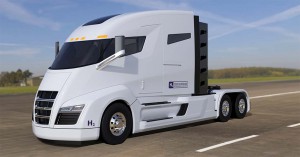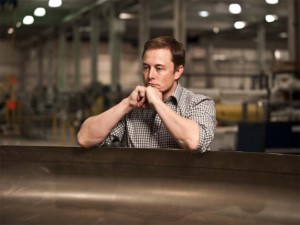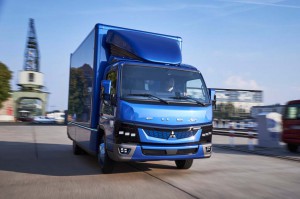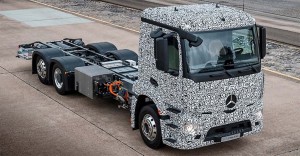
The Nikola One heavy-duty rig will be able to travel up to 1,200 miles on a fill-up, meaning Tesla's got some tough competition.
Tesla CEO Elon Musk isn’t content with his two current battery-electric cars, and has plenty of new options in the works to follow the production launch of the downsized Model 3 set for next month.
In an April tweet, Musk revealed plans to unveil a battery-powered semi-truck in September while also confirming long-rumored plans to add an electric pickup truck to the Tesla line-up, as well. But Musk isn’t the only one who wants to go clean and green in the truck market. Several competitors are laying out plans to launch alternative power models of their own.
That includes both Daimler AG, which could deliver a battery-electric model through any of its five different commercial truck brands, as well as a Salt Lake City-based start-up – which, ironically, has also tapped Musk hero Nikola Tesla for its own name. Nikola Motors has a hydrogen fuel-cell-powered heavy truck it hopes to have in production within the next couple years.
(Tesla adding pickup, semi-truck to line-up. For more, Click Here.)
In his tweet, Musk described the semi-truck project as “next level,” but didn’t offer any other details – such as range, size or cargo capacity – ahead of the September unveiling. Production is expected to begin around 2019.
As for Daimler, it already has begun field testing of the Fuso eCanter in Germany and Portugal and, in March, it announced plans to bring it to the U.S. by 2019. The eCanter is a light-duty model aimed at urban delivery operations, with a range of 60 miles – and the ability to recharge in about an hour.
“We want Fuso to be the Tesla of electric trucks,” said Fuso CEO Jecka Glasman.
Fuso is one of five truck brands that Daimler may eventually use to market battery-powered trucks, the others include Mercedes-Benz Trucks, Freightliner Trucks, Western Star, and BharatBenz.
For the Mercedes-Benz line, the maker is currently testing the Urban eTruck which, it explains, “is based on a heavy-duty, three-axle short-radius Mercedes-Benz distribution truck.” The driveline was developed for the Mercedes Citaro hybrid bus, but here powered by three lithium-ion battery packs. “This results in a range of up to 200 km – enough for a typical daily delivery tour.
(Click Here for details about the Nikola One.)

Tesla CEO Elon Musk is going to have think long and hard about the capabilities of his new semi-truck when it debuts in September.
As for Nikola Motors, it is targeting long-haul, as well as regional, operators with its Nikola One. The big rig replaces a conventional diesel truck engine with a fuel-cell stack capable, it claims, of delivering the equivalent of 20 miles per gallon – or twice what the best of today’s heavy trucks can deliver. And officials from Nikola Motor Co. claim the rig will get up to 1,200 miles on a tank.
The big challenge today would be finding places to fill up, but Nikola plans to set up a network of 364 of its own hydrogen fueling stations in the U.S. and Canada. And to increase the appeal of the big truck – and a second, smaller model to follow, dubbed the Nikola Two – it plans to include the fuel cost in the price of the truck.
Along with its electric semi, Tesla now plans to add an electric pickup that would debut early in the next decade. Again, details are sparse.
More forthcoming has been Canadian start-up Workhorse Group. Its W15 is a 460-horsepower plug-in hybrid pickup designed, it says, for fleet usage. In electric-only mode it will get about 80 miles per charge, but it will have essentially unlimited range using its gas motor. Workhorse claims to already have 5,000 orders for the $50,000 pickup.
Several mainstream manufacturers also have been hinting at interest in that approach, but none have confirmed such a project is underway.
More likely, at least in the near-term, we’re likely to see automakers opt for mileage-boosting hybrid technology. Ford recently confirmed it is working on a gas-electric version of its big F-150 pickup. Whether buyers will get charged up over the concept is uncertain. Chevrolet pulled out of that niche due to weak demand for a Silverado hybrid several years ago.
(To see more about the Workhorse W15 electric pickup, Click Here.)
As with the retail market, Tesla, Daimler, Nikola and Workhorse, among others, will face a variety of challenges marketing alternative-power trucks, primarily range, charging/refill times and cost. But proponents believe there will be a growing market for battery and hydrogen trucks, especially if operating costs come down and the availability of charging and refueling stations expands.


